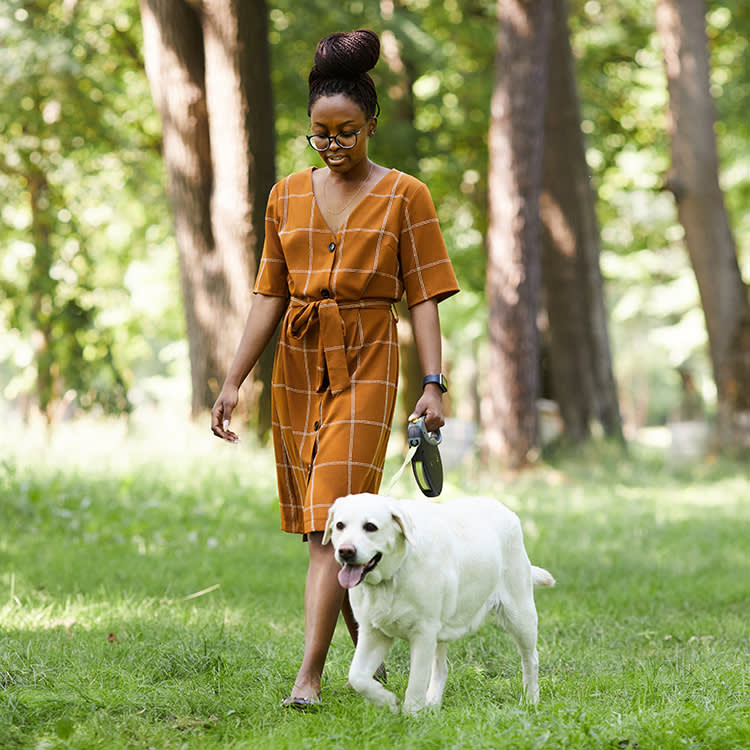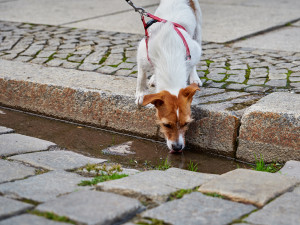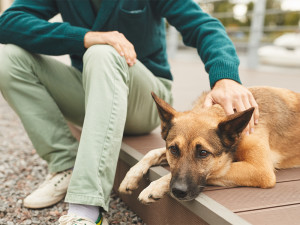What to Do If You Find Worms in Your Dog’s Poop
Hopefully this isn’t info you’ll have to reference often, but here’s what you should know.

share article

Your pet wants you to read our newsletter. (Then give them a treat.)
In this Article:
Why Do Dogs Get Worms? opens in a new tabWhat Do Worms In Dog Poop Look Like?opens in a new tab Identifying the Type of Wormsopens in a new tab Treating Worms in Dogsopens in a new tab How to Clean to Prevent Worm Reinfectionopens in a new tab When to Take Your Dog to the Vetopens in a new tab
All dog parents dread it: picking up a piece of our pup’s poop and discovering worms. If you find wormsopens in a new tab in your dog’s poop, identify the type of worm and treat your dog with a dewormer prescribed by your veterinarian. You should also ensure your dog’s environment is cleaned and remains tidy to prevent reinfection.
Why do dogs get worms?
Dogs usually get intestinal worms by ingesting the parasite’s larvae. Different worm larvae develop in different ways, so the exact way a dog becomes infected with worms varies a little. Common ways dogs are exposed to worm larvae include:
Eating the poop of an infected dog
Licking fleas off themselves
Ingesting the raw muscles of an animal (like a rabbit or mouse) infected with worms
Eating something in soil contaminated by worm eggs
Getting infected before birth through the placenta of an infected mother
Nursing on a mother with worms
Walking through contaminated soil
Some of these methods are easy to prevent (don’t let your dog eat wildlife, even if they really want to), but others can be more difficult to control. Because there are so many ways that dogs can get infected with worms, it’s best to keep them on a medication that kills the worms and/or their larvae before they can cause problems.
What are the signs of worms in dogs?
Finding worms in their dog’s poop comes as a surprise to many pet parents because their dog usually seems fine otherwise. Puppies tend to be more obviousopens in a new tab about their symptoms than adult dogs because they have more problems compensating for the resources the worms are consuming. As cute as potbellied puppies can be, getting rid of that wormy belly will help your puppy feel better and grow properly.
Even adult dogs can show symptoms of intestinal parasites if they have a large load of worms or if they have other health conditions. Some common signs of worms in dogs and puppies include:
Weight loss
Poor hair coat
Potbellied appearance
Decreased appetite
Vomiting
Diarrhea
Blood in the stoolopens in a new tab (either bright red or black and tarry)
Mucus coating the stool
Straining to defecate
Pale gums
Weakness
Dehydration
Dermatitis (skin irritation), especially on the feet
Worms or “grains of rice” in the stool or around the anus
Coughing
Some of the signs here may seem unusual. After all, why would worms that come out in your dog’s poop cause coughingopens in a new tab or skin lesions on your dog’s feet? These unusual symptoms are due to the life cycle of certain types of intestinal worms. The microscopically small larvae of some worms migrate to a dog’s lungs to mature. They are then coughed up and swallowed before setting up their permanent home in the intestines.
Other worms have larvae that can live in the soil for weeks to months and infect your dog by penetrating their skin, most commonly on the feet. These larvae cause local irritation until they work their way into the bloodstream or lymphatic system.
What do worms look like in dog poop?
The appearance of worms in a dog’s poop varies based on the type of wormsopens in a new tab. Some worms are hard to miss because they’re long and fairly thick. Others are short and vanishingly thin. Some even leave segments that look like tiny, mobile grains of rice on your dog’s poop. Gross.
What to do if you find worms in your dog’s poop
After doing a double take and the “ugh, so gross” dance as you confirm that there are actually worms in your dog’s poop, you can decide to do one of two things. Option one is to pick the poop upopens in a new tab in a bag (you are picking up your dog’s poop when you’re out, right?) and bring it to your vet where they’ll be happy to identify the worms for you. Option two is to try to identify the worms yourself so you can satisfy your curiosity immediately.
Identify the type of worms
If you’re up for getting familiar with your dog’s poop, you can try to identify the worms you’re seeing in or on it. It’s fine if you’re not. Poop stinks, and you may have better things to do with your time. But if you’re super into identifying the types of worms that can be in a dog’s poop, you can use this quick guide:
Hookworms: These worms are white and small. They’re about 1 to 1.5 centimeters in length and very thin. Hookworms are a common parasite of dogs, but rarely seen in poop. That’s because they’re very good at hooking latching onto the intestinal wall and remaining there until they die, which can take up to two years.
Whipworms: These worms have a thin, filamentous front end and a thick rear end, resulting in a whip-like appearance. They’re white to brownish in color and can range from 4.5 to 7.5 centimeters in length. They’re more commonly shed in stool during bouts of diarrheaopens in a new tab.
Roundworms: These worms have a more classically worm-like appearance, with a thick, white-ish body that tapers at both ends. Roundworms can grow to be quite large, with some species reaching up to 18 centimeters in length. In addition to making an appearance in poop, these worms can also show up in the vomit of severely affected dogs.
Tapeworms: Dog parents usually recognize tapeworms by finding things that look like mobile grains of rice on the surface of their dog’s stool. These tapeworm segments are white to cream in color and around 1 centimeters by 3 milimeters in size. Tapeworms are rarely seen whole, which is great because some species can grow to a length of several feet in a dog’s intestines. No one wants to see that making an appearance.
Treat the worms
Fortunately, for most worms in dog poop, treatment is not complicated. After the worm is identified, an appropriate dewormer can be prescribed to kill it. Most worms will require at least two treatments to prevent recurrence due to their life cycle. Common intestinal worm treatments may not be effective for immature worms that are migrating through the body. The timing of repeat medication is based on the time it takes them to reach the intestines and mature.
Clean your dog’s space
An important but often overlooked aspect of controlling intestinal parasites is environmental decontamination. This doesn’t mean you’ll be able to eliminate every worm egg from your dog’s environment, but practicing good hygiene can help reduce the risk of reinfection. Pick up your dog’s poop promptly, and wash your hands after handling feces (even if using a baggie). Wash all bowls, clothing, and bedding while your dog is being treated.
Puppies with worms can be especially challenging if they are not potty trained yet. Clean up accidents quickly and thoroughly. Wash your hands after handling your puppy, even if they haven’t just pooped. Young puppies are super cute, but they’re also a little gross and not super careful about avoiding their poop. Practicing good hygiene is important for the safety of your whole family. Humans can be an aberrant host forhookworms and roundwormsopens in a new tab and cause serious issues.
When should you take your dog to the vet for worms?
Going to your veterinarian is the best bet if you ever see worms in your dog’s stool. Although visual identification of worms in dog poop is helpful, many dogs are infected with multiple types of parasitesopens in a new tab. Your vet can check to make sure that no other parasites are present and can prescribe medications appropriate for whatever worms they find. They can also evaluate your pup to make sure there are no other problems developing due to the worms.
How to prevent worms in your dog?
While environmental control can help reduce worm burdens and reduce the chances of infection with worms, the best strategy is to treat this problem preemptively. Luckily, this is easy to do. Monthly heartwormopens in a new tab medications also treat most of the common intestinal worms seen in dogs. Prevention of worms in dogs is usually as simple as giving a monthly pill or chewopens in a new tab. Some monthly medications do not cover whipworms or tapeworms, so check with your vet to see which product is best for your dog.
Another important strategy in preventing your dog from getting intestinal worms is to avoid letting them eat raw meat. This includes both keeping them on a leash to prevent them from catching wildlife and not feeding them a raw food diet.
Are there home remedies for treating worms?
Intestinal worms in dogs require medications to kill them. If you see worms in dog poop, treatment at home will involve repeated doses of deworming medication prescribed by your veterinarian. At-home strategies are usually aimed at preventing reinfection by keeping the environment clean, treating active infections, and keeping up with monthly medications.
FAQs (People also ask):
Can my dog still be around other dogs while being treated for worms?
Your dog can still play with other dogs while being treated for worms. Intestinal worms are not directly transmitted from dog to dog. You should still be sure to pick up your dog’s poop promptly to prevent environmental contamination.
How often should I have my dog checked for worms?
Your adult dog should have routine checks for worms at least yearly with your vet. Puppies are usually checked more frequently because they are more likely to be infected with parasites.
Can I buy over-the-counter dewormers for my dog?
Over-the-counter dewormers are available for dogs. It’s always best to get your dog to your vet to check for other parasites that you can’t see to make sure you get a medication that treats all the worms affecting your dog.
Can worms grow in dog poop?
Many types of worms shed eggs that mature into larvae in dog poop. These are generally not visible to the naked eye. Adult worms won’t develop until the larvae have reached a dog’s intestines.
References:

Dr. Bartley Harrison, DVM
Dr. Bartley Harrison, DVM is a small animal veterinarian based in North Carolina who has practiced emergency medicine since graduating from the Texas A&M College of Veterinary Medicine. His primary interest areas include pain management, cardiology, and the treatment of shock.
He is a member of the Veterinary Emergency and Critical Care Society, American Veterinary Medical Association, and American Medical Writers Association. In addition to his clinical work, he writes pet health articles to help provide accurate information for both new and experienced pet parents. When he’s not working, he enjoys cooking, traveling, reading, and going on adventures with his dog.
Related articles
![Dog drinking water from a puddle in the road]() opens in a new tab
opens in a new tabGiardia in Dogs: Signs, Symptoms and Treatment of This Parasite
If your dog drinks from puddles or splashes around in lakes, read this.
![A woman digging a big hole in her flower bed]() opens in a new tab
opens in a new tabHow to Compost Your Pet’s Poop
Without getting totally grossed out.
![feeding black dog rice water to help relieve diarrhea]() opens in a new tab
opens in a new tabThe Facts of Poop: How to Treat Your Dog’s Diarrhea
Shudder. It happens to all of us.
![Constipated German Shepherd being comforted by its owner]() opens in a new tab
opens in a new tabGut Feelings: Dogs Get Constipated Too
What to do when your pup can’t poop.
![black and white dog looking ill laying on couch]() opens in a new tab
opens in a new tabWarning Signs Your Dog Needs to Go to the ER — Stat
Trust me, I’m a vet.
![A mini golden doodle puppy licking and grooming itself.]() opens in a new tab
opens in a new tabHome Remedies For My Dog’s Bleeding Anus
It’s not a pretty problem, but here are your solutions.








